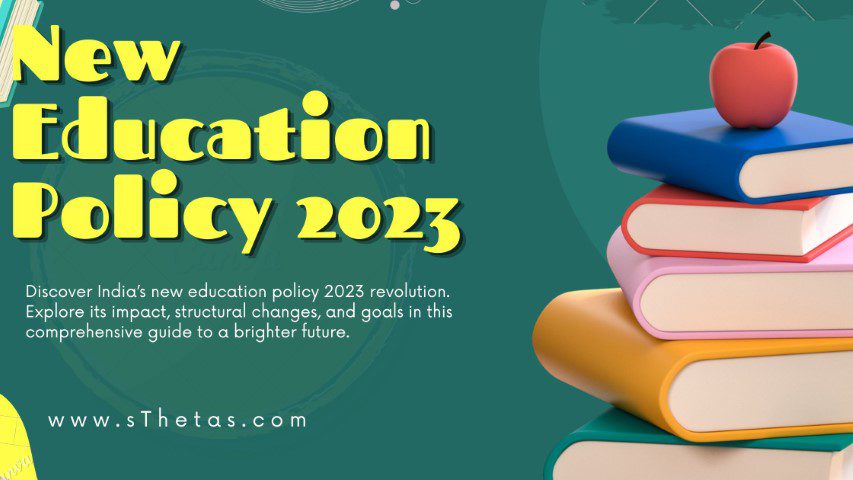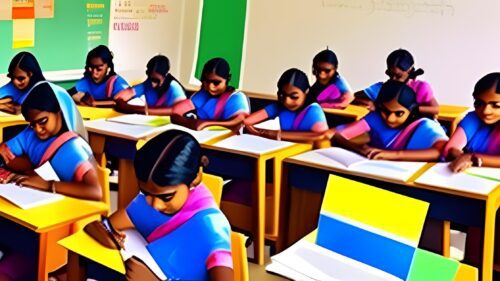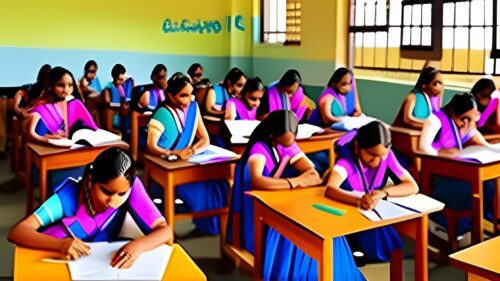Transforming India’s Educational Landscape: The New National Education Policy 2023
Introduction:
In a realm of constant evolution, the new Education Policy 2023 (NEP 2023) emerges as a beacon of transformative change, underpinned by the visionary leadership of Prime Minister Narendra Modi and the Ministry of Human Resource Development. It represents a seismic shift, supplanting a well-entrenched education framework that has held sway for three decades. The NEP 2023 is a clarion call for a modernized education system, one that dares to break free from the constraints of tradition and embrace the digital age with open arms.
Unveiling the Vision:
On the historic date of July 29th, 2020, the New National Education Policy 2023 unfurled its ambitions, having secured the coveted nod from the Union Cabinet. At its core, this policy aspires to position India as an education powerhouse on the global stage. Gone are the days of conventional learning; the NEP 2023 is a clarion call for a paradigm shift. It extols the virtues of online learning, it stretches school hours, and it extols the abandonment of rote memorization in favor of an inclusive and accessible learning environment that empowers individuals from every nook and cranny of our diverse nation.
The Heart of the Matter:
At the heart of this visionary policy lies the cultivation of skills essential for the 21st century—skills like critical thinking, creativity, and problem-solving. The NEP 2023 paints a future where institutions, including universities, harness the full power of technology to elevate the educational experiences of our students.
Reconstructing the Foundation:
A conspicuous departure from the norm is the transition from the 10+2 model to the more progressive 5+3+3+4 structure. This avant-garde framework places a premium on skill development and life competencies at all stages of the educational journey. It’s a bold step toward a future where education is not merely a privilege but an accessible tool for empowerment.
New Education Policy 2023
The Road Ahead: New Education Policy 2023
The National Education Policy 2023 is not just an initiative; it’s a stride towards a future where education is not a luxury but a fundamental right. It promises to open up a world of possibilities, revolutionizing the educational landscape across India. Prepare to be dazzled as we delve deeper into the myriad facets of this transformative policy.
A Glimpse into New Education Policy 2023:
|
Perspectives |
Brief |
| Objective: Equitable and Quality Education | The New Education Policy 2023 in India harbors a grand vision—to provide equitable and quality education for all, spanning the tender ages of 3 to 18. |
| Pedagogical Shift: From Rote to Holistic | This monumental shift pivots the focus away from rote learning, inviting holistic, practical, and problem-solving education into the spotlight. |
| Assessment Approach: Beyond Memorization | Embracing an assessment approach that values problem-solving abilities over memorization, this policy heralds a new era in evaluation methodologies. |
| Language Emphasis: Multilingualism Matters | Implementing the three-language formula, NEP 2023 champions regional languages, Hindi, and English as vital tools for communication and knowledge acquisition. |
| Curriculum Changes: A New Blueprint | With a revised curriculum, the NEP prioritizes fundamental concepts, skills, and multidisciplinary knowledge, steering away from narrow specialization. |
| Technology Integration: The Digital Revolution | The policy seeks to enhance accessibility and efficacy through the strategic integration of technology, making learning a dynamic and engaging experience. |
| Equitable Education: Bridging the Divide | NEP 2023 endeavors to bridge the urban-rural education gap, ensuring that all students have equal access to quality education. |
| Teacher Quality Enhancement: Elevating Educators | A focus on teacher eligibility tests, professional development, and improved education programs promises a brighter future for both educators and students. |
| Vocational Education: A Glimpse into the Future | Incorporating vocational and technical education into the mainstream, the policy better equips students for the demands of the workforce. |
| Higher Education Regulation: For Autonomy and Excellence | The establishment of a National Higher Education Regulatory Council signifies a commitment to oversight and autonomy promotion in higher education. |
| Educational Structure: The 5+3+3+4 Revolution | Replacing the old 10+2 model, the 5+3+3+4 structure offers a more flexible and focused approach to learning. |
| Higher Education Enrolment Goal: The 50% Target | The NEP 2023 sets its sights on achieving a 50% higher education enrolment rate by 2035. |
| MPhil Elimination: A Notable Change | By eliminating the requirement for an MPhil degree, the policy streamlines academic pathways. |
Decoding the 5+3+3+4 Structure:
The New Education Policy (NEP) 2023 beckons us into an era of educational transformation, primarily through its innovative 5+3+3+4 structure, a departure from the conventional 10+2 model. Let’s embark on this educational odyssey.
Four Segments of Education:
NEP 2023 introduces a Pedagogical and Circular Structure that divides student education into four stages: Foundational, Preparatory, Middle, and Secondary. These stages are the crucible in which a student’s holistic development takes shape.
- Foundational Stage (5 Years):
The Foundation Stage spans five formative years, encompassing three years of Anganwadi/Pre-Primary/Calvatia and the first and second grades. It’s a phase dedicated to fostering a rock-solid educational foundation and essential skills.
- Preparatory Stage (3 Years):
The Preparatory Stage spans grades three to five, providing a bridge to intermediate and secondary education. It’s all about building a sturdy academic base and preparing students for advanced subjects.
- Middle School (3 Years):
Grades six to eight from the Middle School stage. It offers students a comprehensive learning experience, acting as a stepping stone toward secondary education. Here, educators focus on enhancing critical thinking and analytical skills.
- Secondary Stage (4 Years):
The Secondary Stage, covering grades nine to twelve, offers an extended duration for in-depth subject exploration, skill specialization, and holistic development.
The Significance of New Education Policy 2023:
The 5+3+3+4 Structure brings forth a multitude of benefits:
- Holistic Cognitive Growth: This new framework actively nurtures comprehensive cognitive development, acknowledging the multifaceted nature of learning.
- Optimized Schooling Phases: The structure enriches a student’s educational journey, spanning from foundational to secondary stages, providing continuity and coherence.
- Right to Education: By encompassing ages 3 to 18, the structure ensures early and continuous access to education, upholding students’ right to learn from the very beginning.
- Enhanced Student Foundations: It enhances foundational learning, creating a stronger base for students as they progress through different stages of education.
- Improved Student Retention: Expect higher student retention rates as this framework paves the way for longer academic careers within the same institutions.
- Versatile Benefits: Comprehensive benefits touch every aspect of a student’s development, encompassing academic, social, and personal growth.
- Positive Impact on Literacy: This approach contributes to a higher literacy rate, positioning India for a future of greater educational attainment.
- Forward-Looking Approach: The shift to this modern Structure reflects a progressive mindset, aligning education with the evolving needs of society and the demands of the 21st century.
- Comprehensive Preparation: By encompassing a wider age range, the Structure better prepares students for the challenges of further education, career pursuits, and life in general.
- National Development: The 5+3+3+4 Structure promises to cultivate well-rounded individuals poised to contribute meaningfully to the nation’s growth and prosperity in the long run.
New Education Policy 2023
Impact of New Education Policy 2023:
The New National Education Policy 2023 promises a revolution in education, redefining student learning while reshaping the role of educators. Under this policy, teachers are required to hold a comprehensive 4-year integrated B.Ed. degree, ensuring that well-qualified instructors play a pivotal role in shaping students’ destinies. This emphasis on teacher qualifications is set to elevate the standard of teaching and create a more conducive learning atmosphere.
Higher Education Evolution:
The policy aims to establish a central body overseeing higher education (excluding law and medical studies) to enhance and standardize education across all institutions.
The Power of Mother Tongue Education:
An integral aspect of the NEP is the promotion of instruction in students’ native languages up to the fifth grade, with the possibility of extending it to the eighth grade in the future. This language provision enhances students’ comprehension, fostering a stronger connection to their cultural roots.
The objective of NEP 2023:
India’s New National Education Policy 2023 aspires to position the nation as a prominent global hub of knowledge and innovation. This ambitious vision introduces four key pillars: accessibility, equity, high quality, and accountability. The strategy ushers in innovative primary and higher education approaches, fostering holistic student development and facilitating broad-based learning.
School Education Transformation:
The policy envisages foundational literacy and numeracy by 2025, reducing the burden of exams by introducing assessments in grades 2, 5, and 8. It promotes interdisciplinary education, integrates coding into the curriculum, and enhances student health and well-being through improved meal schemes.
Higher Education Revolution:
Higher education is reimagined with multidisciplinary bachelor’s degrees, the phasing out of M.Phil. courses, and the establishment of regulatory bodies to oversee education and funding. International collaboration is encouraged, and fees are regulated for both public and private universities.
A Glimpse into the Future:
The New National Education Policy 2023 envisions a progressive, flexible, and inclusive educational landscape, empowering students with skills for an ever-changing world, while upholding academic excellence and holistic development.
In Conclusion:
The National Education Policy 2023 marks a monumental transformation in Indian education, enhancing inclusivity and a student-centered approach. It seeks to address educational challenges and provide high-quality learning opportunities to all, regardless of their economic background. The policy advocates for a unified educational framework, prioritizing skill development, interdisciplinary learning, and the cultivation of innovative and analytical thinking. It places technology at the forefront of education, promising a brighter and more equitable future for students across the nation.
FAQ: New Education Policy 2023
Q1: What is the National Education Policy 2023 (NEP 2023), and why is it significant?
Answer: NEP 2023 is a transformative policy in India’s education landscape, aimed at modernizing the system. It’s significant because it promotes equitable and quality education, emphasizes skill development, and aligns education with the demands of the 21st century.
Q2: How does NEP 2023 impact the structure of education in India?
Answer: NEP 2023 replaces the traditional 10+2 model with a flexible 5+3+3+4 structure, offering a more comprehensive and holistic educational approach.
Q3: What are the key goals of NEP 2023 regarding school education?
Answer: NEP 2023 aims to ensure foundational literacy and numeracy, revamp examination structures, promote interdisciplinary education, introduce coding, and focus on students’ health and well-being.
Q4: How will the New Education Policy 2023 affect higher education in India?
Answer: NEP 2023 introduces multidisciplinary bachelor’s degrees, phases out M.Phil. courses, establishes regulatory bodies for higher education, encourages international collaboration, and regulates fees for both public and private universities.
Q5: How does the policy impact teachers and teacher qualifications?
Answer: NEP 2023 requires teachers to hold a comprehensive 4-year integrated B.Ed. degree, emphasizing the importance of well-qualified educators in shaping students’ futures.
Q6: What is the significance of promoting instruction in students’ native languages?
Answer: NEP 2023 promotes instruction in native languages up to the fifth grade, fostering better comprehension and a stronger connection to students’ cultural roots.
Q7: How does New Education Policy 2023 align with international educational standards?
Answer: NEP 2023 encourages international collaboration by allowing foreign universities to establish campuses in India, providing students with global exposure and aligning with international educational standards.
Q8: How does the New Education Policy 2023 aim to bridge the urban-rural education gap?
Answer: The policy focuses on providing equal access to quality education for all students, regardless of their geographical location, thus addressing the urban-rural education divide.
Q9: How can students benefit from the 5+3+3+4 structure introduced by New Education Policy 2023?
Answer: The 5+3+3+4 structure offers students a more flexible, comprehensive, and continuous educational journey, better preparing them for the challenges of further education and careers.
Q10: What role does technology play in the New Education Policy 2023?
Answer: Technology integration is a key aspect of the policy, aimed at enhancing the accessibility and effectiveness of education through digital tools and resources.
These FAQs and answers provide additional clarity and information to readers, helping them better understand the intricacies and significance of the National Education Policy 2023 in India.Top of Form
Read our other blogs



1 thought on “New Education Policy 2023”